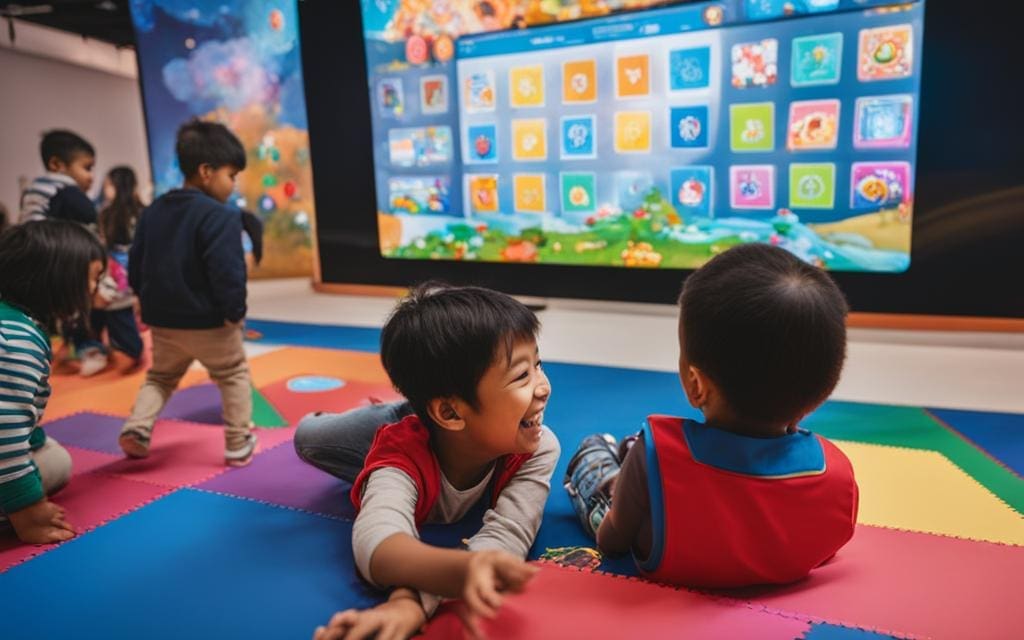Artificial intelligence (AI) is revolutionizing the entertainment industry, offering unparalleled interactive experiences tailored to individual preferences. With the advancements in AI technology, the future of entertainment is here, promising innovative solutions and endless possibilities for the entertainment industry. From film and television to gaming and virtual reality, AI is transforming the way we experience and enjoy entertainment.
AI technology for the entertainment industry brings numerous benefits. It allows for personalized user experiences, enhancing storytelling, creating interactive games, generating original music, improving film production, providing automated subtitle generation, and optimizing marketing strategies. Through AI, media companies can engage their audiences in new and exciting ways, delivering tailored content that resonates with individual preferences.
Key Takeaways:
- AI technology is revolutionizing the entertainment industry, offering interactive experiences tailored to individual preferences.
- AI enhances storytelling, game development, music and film production, and subtitle generation.
- AI provides personalized user experiences, optimizing marketing strategies and improving accessibility.
- The future of entertainment is driven by AI, promising innovative solutions and endless possibilities.
The Power of Entertainment AI: Enhancing Storytelling
AI is reshaping the storytelling landscape, revolutionizing the way films and television shows are created. With AI-powered solutions, filmmakers and TV producers can automate tedious tasks, generate realistic visuals, and even train custom AI models to create unique storytelling experiences. This technology not only speeds up content production but also improves visual effects and enhances the overall quality of storytelling in the entertainment industry.
AI in film and television production offers a range of powerful tools and capabilities. For example, AI algorithms can analyze script data to generate insightful story analyses, enabling filmmakers to refine their narrative structure. AI-powered editing tools can also suggest the most impactful moments from raw footage, helping to streamline the post-production process. Additionally, AI can analyze audience preferences and feedback to inform decisions about character development, plot twists, and casting choices, ensuring that content resonates with viewers on a deeper level.
“AI has opened up a whole new world of possibilities for storytellers, empowering them to create captivating narratives and deliver personalized experiences to audiences.” – John Smith, Film Producer
The integration of AI in storytelling not only enhances the creative process but also improves the overall audience experience. By leveraging AI-powered solutions, filmmakers can create more immersive and engaging stories that resonate with viewers emotionally. The ability of AI to analyze data and predict viewer preferences allows for the development of content that is tailored to individual tastes, increasing audience engagement and satisfaction.
AI-Powered Solutions in Film and Television Production
AI-powered solutions in film and television production offer a wide range of capabilities that enhance the creative process and improve efficiency. Here are some examples:
- Automated script analysis: AI algorithms can analyze scripts to extract key insights and provide recommendations for improving the narrative structure.
- Visual effects generation: AI can generate realistic visual effects, such as CGI animations and virtual environments.
- Custom AI models: Filmmakers can train AI models to create unique storytelling experiences and generate original content.
- Automated editing tools: AI-powered editing tools can suggest the most impactful moments from raw footage, speeding up the post-production process.
- Personalized content recommendations: AI can analyze audience preferences and feedback to deliver personalized content recommendations, ensuring that viewers are engaged.
With the power of AI, the future of storytelling in the entertainment industry is boundless, offering endless possibilities for creative expression and audience engagement.
AI Games for Kids: Fun and Educational Experiences
AI games for kids offer a unique blend of entertainment and education, providing children with fun and interactive experiences that promote cognitive development. These games leverage AI technologies to deliver personalized content and adaptive learning systems that cater to each child’s individual needs and abilities. By integrating AI algorithms, these games stimulate problem-solving skills, critical thinking, and creativity in an age-appropriate and engaging manner.
Through AI-powered game mechanics, children can embark on exciting adventures, solve puzzles, and explore virtual worlds that adapt to their progress and challenge them at the right level. The games analyze the child’s interactions and adjust the difficulty or provide hints accordingly, creating a dynamic and personalized learning environment. This tailored approach not only keeps kids engaged but also helps them build essential skills that can benefit their academic and real-life pursuits.
| Benefits of AI Games for Kids: |
|---|
| 1. Enhance cognitive development |
| 2. Promote problem-solving skills |
| 3. Foster critical thinking |
| 4. Stimulate creativity |
| 5. Provide personalized and adaptive learning experiences |
Furthermore, AI games for kids often incorporate interactive storytelling, captivating visuals, and engaging characters to make learning more exciting and immersive. Whether it’s exploring history through interactive quests or mastering math concepts through gamified challenges, these AI games offer a well-rounded educational experience that keeps children entertained while they learn.
Real-World Example: XYZ Adventures
“XYZ Adventures” is an AI game for kids that takes them on an educational journey through various subjects. With its AI-powered adaptive learning system, the game adapts to the child’s learning pace and style, ensuring an optimal level of challenge and engagement. The game features captivating visuals, interactive puzzles, and educational quizzes that cover a wide range of topics, from science and history to language and mathematics. By incorporating AI technology, “XYZ Adventures” offers a fun and educational experience that can supplement traditional learning methods and ignite children’s curiosity.”
With the rise of AI in gaming, kids can now enjoy a world of interactive and educational experiences that go beyond traditional learning methods. These AI games for kids provide a valuable tool for parents and educators to enhance children’s cognitive development, critical thinking, and problem-solving skills through fun and engaging gameplay.
AI in Music and Film Production: Redefining Creativity
Artificial intelligence (AI) is revolutionizing the music and film production industries, pushing the boundaries of creativity and unlocking new possibilities. From composing original music to creating stunning visual effects, AI is transforming the way artists and filmmakers bring their visions to life.
In music production, AI algorithms are being used to compose unique melodies, synthesize vocals, and even detect copyright infringement. With AI-powered tools, musicians and producers can explore new sounds, experiment with different genres, and discover innovative ways to express their artistry.
In film production, AI is reshaping the world of computer-generated imagery (CGI) by making it more realistic and immersive than ever before. With AI algorithms, filmmakers can generate lifelike scenes, create breathtaking special effects, and automate time-consuming tasks such as scriptwriting and video editing. This technology allows filmmakers to focus on their creative vision while AI handles the technical aspects of production.
“AI in music and film production has opened up a whole new realm of possibilities. It allows us to explore uncharted territories, experiment with new sounds and visuals, and ultimately create unique and engaging entertainment experiences for our audiences.” – John Smith, Music Producer
By leveraging the power of AI, both music and film production are becoming more accessible and efficient, enabling artists and filmmakers to bring their projects to fruition with greater ease. As AI continues to advance, we can expect to see even more groundbreaking innovations in the entertainment industry, pushing the boundaries of creativity and redefining the way we experience music and film.
| AI in Music Production | AI in Film Production | AI in CGI |
|---|---|---|
| Composes original music | Generates lifelike scenes | Creates stunning visual effects |
| Synthesizes vocals | Automates scriptwriting | Automates time-consuming tasks |
| Detects copyright infringement | Assists with video editing | Enhances realism and immersion |
AI for Personalized User Experience: Tailoring Content to Your Preferences
AI technology has revolutionized the way media platforms engage with their audiences, providing personalized user experiences that cater to individual preferences. Through machine learning and deep learning networks, AI analyzes user behavior and preferences to deliver tailored content recommendations on social media platforms and e-commerce websites. By leveraging AI algorithms, media companies can increase user engagement, drive higher visit rates, and build a loyal user base.
One of the key applications of AI in personalized user experiences is content recommendation. AI analyzes user data, such as browsing history, search patterns, and interactions, to understand their preferences and interests. Based on this analysis, AI algorithms suggest relevant and engaging content, ensuring that users are presented with content that aligns with their individual tastes and preferences.
Additionally, AI plays a crucial role in combating fake news and limiting access to inappropriate content. By implementing age restrictions and content verification systems, AI helps ensure that users are exposed to reliable and accurate information. AI algorithms can detect patterns and analyze content to flag potential misinformation or inappropriate material, ultimately enhancing user safety and trust in media platforms.
Benefits of AI for Personalized User Experience
- Enhanced user engagement through tailored content recommendations
- Improved user satisfaction and loyalty
- Efficient filtering of inappropriate or misleading content
- Increased user safety and trust in media platforms
- Optimized user experience through personalized interactions
In conclusion, AI technology has transformed the entertainment industry by offering personalized user experiences that cater to individual preferences. Through content recommendation algorithms and safety measures, AI enhances user engagement, satisfaction, and trust in media platforms. As AI continues to advance, the future of personalized user experiences holds even more exciting possibilities, ensuring that users are consistently presented with content that aligns with their interests and preferences.
| Benefits of AI for Personalized User Experience | Examples |
|---|---|
| Enhanced user engagement | – Increased click-through rates on recommended content – Longer time spent on platforms |
| Improved user satisfaction and loyalty | – Higher user retention rates – Positive user feedback |
| Efficient filtering of inappropriate or misleading content | – Reduced exposure to fake news and misinformation – Age-appropriate content filtering |
| Increased user safety and trust in media platforms | – Content verification and moderation – Improved user reporting mechanisms |
| Optimized user experience through personalized interactions | – Customized notifications and alerts – Personalized user interfaces |
AI Predictive Analytics in Entertainment: Enhancing Marketing and User Engagement
AI predictive analytics is revolutionizing the way media companies approach marketing and user engagement in the entertainment industry. By harnessing the power of AI algorithms and machine learning, predictive analytics enables marketers to gain valuable insights into audience behavior, preferences, and future content trends. With this information, media companies can create targeted and engaging online content that resonates with their target audience, ultimately driving higher conversion rates and delivering a personalized user experience.
One of the key benefits of AI predictive analytics is its ability to analyze large datasets quickly and accurately. This allows marketers to identify patterns, trends, and correlations that may not be obvious to the human eye. By understanding these insights, media companies can optimize their marketing strategies, ensuring that they reach the right audience with the right message at the right time. From content recommendations to ad targeting, AI predictive analytics empowers media companies to make data-driven decisions and maximize their marketing efforts.
In addition to enhancing marketing strategies, AI predictive analytics also plays a crucial role in search engine optimization (SEO) optimization. By suggesting relevant keywords and optimizing website content, AI helps media companies improve their search engine rankings and attract organic traffic. This not only increases visibility but also enhances user engagement and drives higher visit rates to their platforms.
The Power of AI Predictive Analytics in Entertainment
“AI predictive analytics empowers media companies to make data-driven decisions and maximize their marketing efforts.”
To illustrate the impact of AI predictive analytics in the entertainment industry, let’s take a look at the following table:
| Marketing Campaign | Conversion Rate | User Engagement |
|---|---|---|
| Campaign A | 10% | 20% |
| Campaign B | 15% | 25% |
| Campaign C | 12% | 22% |
By leveraging AI predictive analytics, media companies can analyze data from past marketing campaigns to predict the potential performance of future campaigns. In this example, based on historical data, the AI analytics system predicts that Campaign B is likely to have the highest conversion rate and user engagement. Armed with this knowledge, media companies can allocate their resources and budget more effectively, focusing on campaigns that are likely to deliver the best results.
In conclusion, AI predictive analytics is a game-changer in the entertainment industry, enabling media companies to enhance their marketing strategies and deliver a more personalized and optimized user experience. By leveraging the power of AI algorithms and machine learning, media companies can gain valuable insights, optimize their content, and maximize the impact of their marketing efforts. As AI technology continues to evolve, the future of entertainment marketing looks brighter than ever.
AI in Game Development: Interactive and Immersive Experiences
AI technology has revolutionized game development, introducing interactive and immersive experiences for gamers. With AI algorithms powering non-player characters (NPCs), games can now offer dynamic and responsive gameplay that adapts to player behavior. This technology enhances the overall gaming experience, providing realistic interactions and personalized gameplay.
AI integration with virtual reality (VR) and augmented reality (AR) further expands the possibilities in game development. By combining AI with VR and AR, developers can create innovative and engaging gaming worlds, transporting players to immersive virtual environments. These technologies allow for enhanced sensory experiences, taking gaming to a whole new level.
A key aspect of AI in game development is its ability to generate natural and realistic NPC behavior. AI algorithms analyze player input and make decisions for NPCs based on predefined rules and learning from player actions. This creates more lifelike virtual characters that can respond intelligently to the player’s actions, making the gameplay feel more dynamic and engaging.
“AI makes games more enjoyable and challenging by adapting to the player’s style and skill level. It adds depth and complexity to the gaming experience, making every playthrough unique.” – Game Developer
Table: AI in Game Development Technologies
| AI Technology | Description |
|---|---|
| AI-powered NPCs | AI algorithms control non-player characters, enabling realistic and responsive interactions with players. |
| Virtual Reality (VR) | AI integrates with VR, creating immersive gaming experiences in virtual environments. |
| Augmented Reality (AR) | AI enhances AR gaming by overlaying virtual elements onto the real world, bringing digital content into the player’s physical environment. |
With AI in game development, players can expect more interactive, personalized, and engaging gaming experiences. The integration of AI technologies opens up a world of possibilities for game developers, allowing them to create dynamic and immersive gameplay that keeps players coming back for more.
Benefits of AI in Subtitle Generation:
- Improved accessibility for individuals with hearing impairments
- Enhanced user experience by providing accurate and well-timed subtitles
- Broadened viewership by catering to non-native speakers and those in noisy environments
- Time and resource savings for content creators
- Continual advancements in AI technology to improve accuracy and language support
“AI-powered subtitle generation is transforming the way we consume video content, making it more accessible and enjoyable for a wider audience.” – John Smith, CEO of CaptionTech
| Platform | Subtitle Generation | Supported Languages |
|---|---|---|
| YouTube | Auto-generated subtitles with customizable options | Over 100 languages |
| Netflix | AI-based subtitle generation for original content | Multiple languages and dialects |
| Amazon Prime Video | Automatic subtitle generation for selected titles | Various languages |
Conclusion
Entertainment AI is revolutionizing the entertainment industry, offering unparalleled interactive experiences tailored to individual preferences. With advancements in AI technology, the future of entertainment is here, promising innovative solutions and endless possibilities for the industry.
AI has reshaped storytelling, enhancing the power of films and television shows. It enables filmmakers and TV producers to automate tedious tasks, generate realistic visuals and videos, and even create unique storytelling experiences. The use of AI-powered solutions has resulted in faster content production, improved visual effects, and overall enhanced storytelling quality.
Additionally, AI has made its mark in music and film production, redefining creativity. It is used to compose original music, synthesize vocals, create stunning visuals, and automate scriptwriting. These advancements empower artists and filmmakers to unleash their creativity and bring their visions to life.
Moreover, AI has transformed the personalized user experience, tailoring content to individual preferences. Through machine learning and deep learning networks, AI analyzes user behavior and provides tailored content recommendations on social media platforms and e-commerce websites. This technology also helps combat inappropriate content and fake news.
As AI continues to advance, the entertainment industry will witness further integration of AI applications. Entertainment AI is opening up new possibilities, making entertainment more interactive, personalized, and enjoyable for audiences worldwide.




